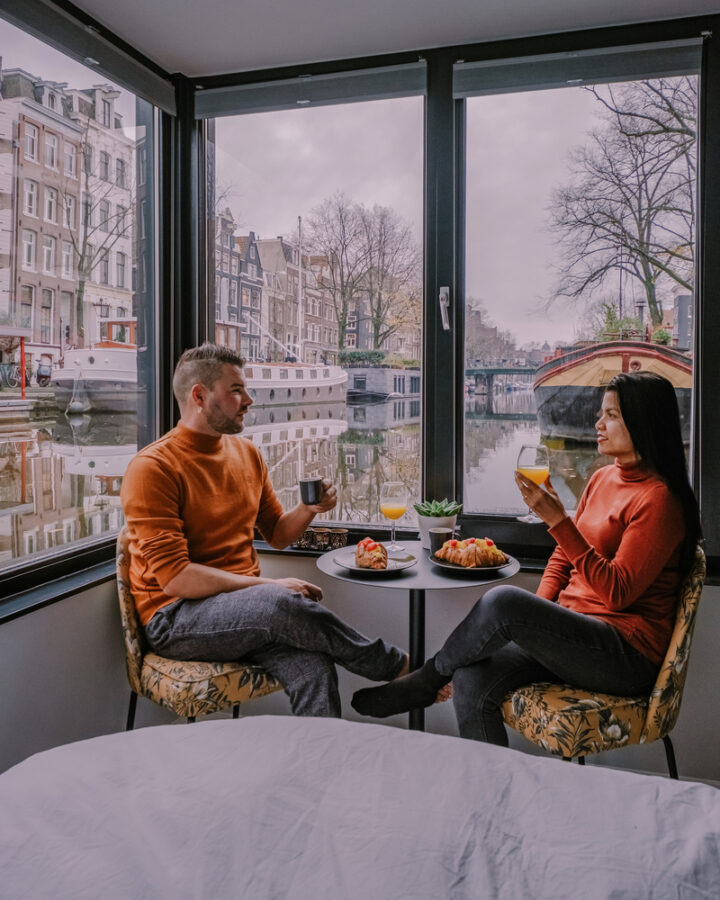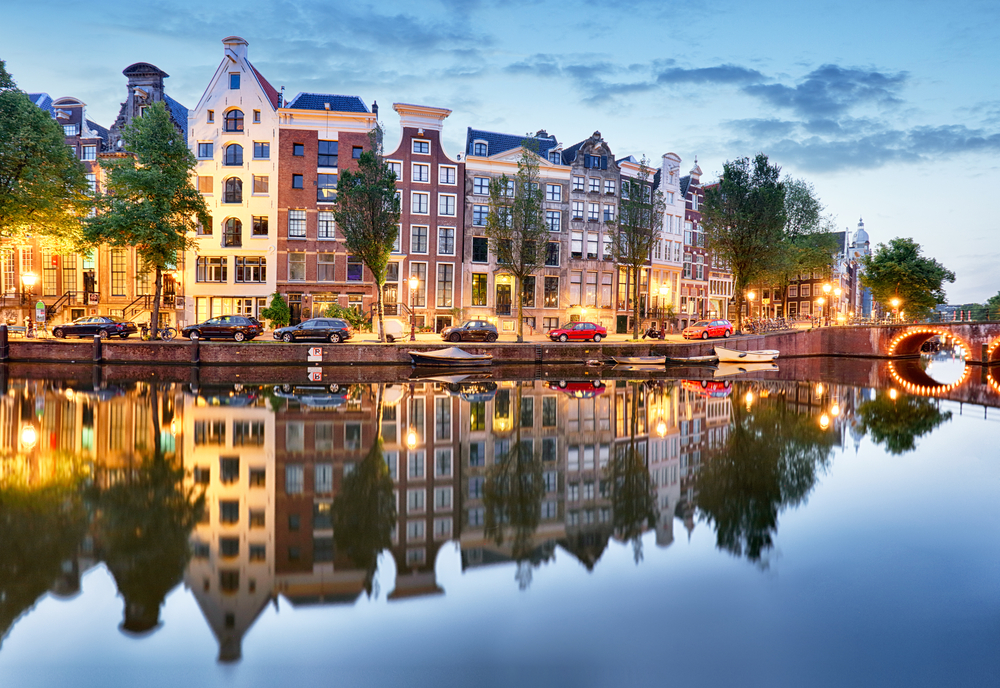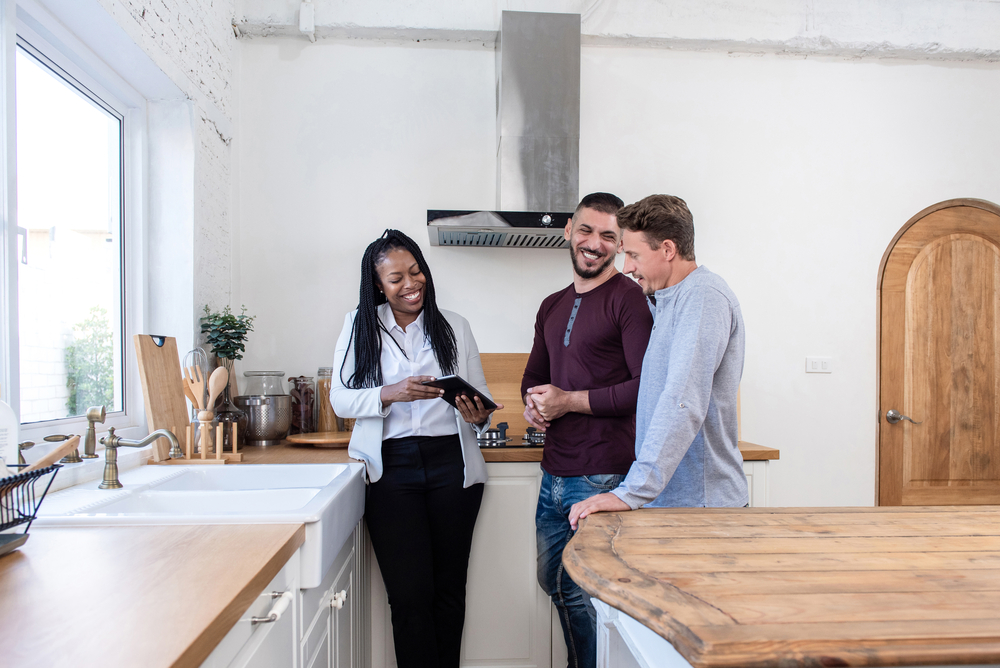Sure you’re all up-to-date on the latest developments about buying a house in the Netherlands. But how does it work for internationals looking for that dreamy Dutch house and mortgage?
How do you place an offer on a house? What do you do when your offer is accepted? What kind of paperwork is involved in buying a Dutch home?
Buying a house in the Netherlands is something that even Dutchies struggle with. Everybody can use some help with that — especially internationals.
1. Consider how long you will stay in the Netherlands

Buying a house in the Netherlands might not be the right thing for everybody. If you expect to move to a different country one to two years from now, it’s probably not the best idea.
READ MORE | Interest, inflation, and lower house prices: what does this mean for Dutch housing?
The reason for this is simple: you have to invest some of your own money when you buy a house, and you might just lose that money if you need to sell in the short term.
But if you’re planning to stay here for a couple of years (and you know, care about your money), buying a house in the Netherlands may just be the smart thing to do.
2. Have a free consultation and see if you can actually get a Dutch mortgage
In the olden days, when people worked for 50 years for the same employer, one could only hope to obtain a Dutch mortgage when they were on a contract for an indefinite period.
This was the fabled vast contract, meaning a permanent employment contract.
But this is 2023, and having a permanent contract is no longer an absolute must when you want to get a mortgage in the Netherlands. That’s good news for all you ZZP’ers, college-debt-having, flexible-contract folks out there!
READ MORE | How to get a Dutch mortgage as a Brit, freelancer, and more
To see if you can get a Dutch mortgage and, even more importantly, how much money a bank will lend you, it’s best to set up an appointment with a mortgage advisor.
By speaking with an advisor, you can find out everything about the conditions of getting a Dutch mortgage, ask questions specific to your situation, or get into the nitty-gritty about how high a mortgage you can actually obtain.
READ MORE | Your borrowing power for a Dutch mortgage in 2022
3. What are your Dutch housing preferences?

Now that you have an idea of your budget, it’s time to determine what you really want from a Dutch house.
Of course, a lot of this is personal, it all depends on where you work, what you like, if you have kids, or have a dream about living on a Dutch houseboat, for example.
But some of these Dutch housing dreams require a bit of knowledge about the Dutch housing market.
For example, buying a house from the 1700s might be nice but please do know that you’re in for a bit of maintenance — which can be expensive here since a lot of Dutchies are renovating nowadays.
READ MORE | Sustainability, remodelling, and your mortgage in the Netherlands
And who can blame them? With inflation hitting the Netherlands hard, and the country boasting some of the highest gas prices in the entire EU, those with older homes need to make sure their windows are fitting as snugly as possible.

READ MORE | Buying an old vs. new house in the Netherlands: the key differences
Or, for example, would you rather live in the city or the countryside? Lately, the pull of the Randstad has started to reverse, with more people choosing to buy outside of the ring of cities as opposed to within it!
If your attraction to the Dutch countryside was for purely budgetary reasons, then you may want to reconsider. With higher demand for housing outside of the Randstad, comes higher selling prices for said houses.
That being said, Kenneth points out that there’s still a huge attraction to the Dutch countryside.
“The prices per metre squared outside of the Randstad are still not even close to the prices within the Randstad, as these are also still going up,” he explains.
“Combine this with the fact that many of us are (still) embracing the hybrid way of working — and as a result searching for more metres squared to create that home office — still makes the “countryside” a really attractive area to buy!”
4. Find that house and make an offer

So you spotted a house, viewed it and want to make an offer? Well, we don’t want to pressure you, but this is a crazy market and houses in the Netherlands go fast.
If you’ve found a house that you like, make an offer as soon as you’ve made up your mind.
READ MORE | €50,000 subsidy when you buy a house in the Netherlands? Yep, it’s about to happen
And if you really want the house, then it’s likely you’ll be offering more than the asking price. However, we do have some good news: the percentage of people who overbid on a house has dropped significantly — especially in the last half of 2022.
To give you an idea, in the fourth quarter of 2021, 80% of successful house purchases were the result of overbidding. In the second half of 2022, this percentage has almost halved, falling to 44% — meaning 2023 is looking promising.
How should you make an offer on a house in the Netherlands?
By email! It may feel weird that you’re casually sending an email that says “I want to buy your house for €543,000” — but this is how it’s done in the Netherlands. This can be sent either by you or get your realtor (makelaar) can do it.

Next, there are two Dutch phrases you’ll need to know:
Onder voorbehoud van Financiering
Literal translation: with the condition of financing.
Actual meaning: subject to your finance being approved. Essentially, if you’re not approved for your mortgage, the deal is off.
Why you need it: if you don’t include this in your contract and can’t secure your finance, you may have to pay 10% of your offer as a penalty!
Bouwkundige Keuring
Literal translation: with the condition of a construction examination
Actual meaning: building or architecture inspection
Why you need it: if this is a relatively old house you intend to buy, you want to get this as a condition.
This check will point out any major flaws in the building that could end up costing you money later.
If your offer is subject to a bouwkundige keuring you can still cancel it if they find a structural flaw in the house — or a giant sinkhole.
5. Offer accepted for a Dutch house? Make sure you’re ready!

All that hard work has led you to this: your offer on a Dutch house has been accepted, and you’re almost a Dutch homeowner! Hoera!!
Enjoyed that moment? Good! Because the work isn’t finished at all. You still need to arrange your Dutch mortgage — we’ll get into in the next steps.
But for now enjoy, go out for a walk or drinks and think about whether you’re really happy with that house. After all, buying a house in the Netherlands is a very quick process.
The Three Day Cooling Down period
Let’s say you take your walk and mull things over. You’ve just bought a house in Amsterdam for half a million euros and suddenly realize you’re totally not up for it.
Geen stress (No stress). This is where the cooling-down period comes into play!
Whenever you agree to buy a house in the Netherlands, you can cancel the deal within three working days. This can be done without specifying any reason and without it costing you a cent.
The cooling-down period starts just after midnight the day after you’ve received the written news that your offer has been accepted. If you do decide to pull out, you need to explicitly inform the selling party.
It’s also good to know that there’s no cooling-off period for the selling party unless this has been specifically agreed upon in the sales contract.
6. Prepare your Dutch mortgage application (it’s paperwork time!)

If you’re wondering what’s next, it’s paperwork (and loads of it). A good mortgage advisor can help you with this.
So, what do you need to get your hands on?
Employer’s declaration
This is a statement made by your employer confirming your annual income based on salary, bonuses, and fringe benefits. This could be as simple as showing your employment contract.
Salary specification
This is your monthly payslip, which will correspond to the information given in your employer’s statement, and will also show aspects such as the 30% ruling, expenses, payable taxes, etc.
Necessary information about the mortgaged property, such as:
- a copy of the purchase agreement signed by both parties,
- the original valuation/appraisal report, and
- a copy of a survey report.
I’m not going to lie, this is a bunch of work. But if your employer helps you out and you’ve got a good mortgage advisor, it’s definitely manageable.
Then, your mortgage company will take care of the next steps. “We gather all the paperwork, discuss your situation and wishes, then we select the money lender with the best fit and apply for an offer,” explains Kenneth.
After you’ve chosen your mortgage provider, your broker will review your paperwork and get back to you with whether or not your Dutch mortgage application is accepted.
7. Sign the dotted line and, celebrate!

Rrrring! It’s your mortgage advisor on the phone telling you that the bank has accepted your mortgage application. This is it!
We’re entering the final stages of the process of becoming a homeowner and getting that Dutch mortgage. This is where you sign all the paperwork.
All this magic will happen at the notary’s office, or as they say in Dutch, the notaris.
The notary manages all the legal steps involved in buying a home. They’ll also manage the exchanging of the keys and wiring of the money.
Your mortgage advisor should have some good advice on which notary to pick in which region.
If you worry that language barriers are going to be an issue, your advisor will also have good contact with trustworthy interpreters should you need any, and will even hold your hand at the notary if you need it.
After you’ve signed off on all the paperwork at the notary you get the keys, and it’s actually your home!
Note: Some people may perceive the notary as a costly and useless step in the mortgage process. But it’s really helpful to have somebody draw up all the papers, calculate the costs, and make sure everything goes okay bureaucratically.
8. Sort your taxes and be a responsible adult

You can relax now, or start renovating your new home straight away. But you’ll also want to get hands-on with your taxes after you set up a Dutch mortgage.
Why? Because you can actually get a quick refund from the Dutch tax office that compensates for some of the expenses involved in buying said Dutch house.
READ MORE | After buying a house in the Netherlands – the ultimate aftersale guide for expats
Then there’s also the “mortgage interest deduction” that you need to be aware of.
This is a sweet Dutch tax arrangement that you can apply for. It basically means you can deduct the costs of the interest that you’re paying for your mortgage
Word to the wise: being a homeowner in the Netherlands greatly influences your tax situation, so make sure to ask your mortgage adviser all about the upsides of the Dutch tax system when it comes to owning a home.
Have you recently bought a home in the Netherlands? Tell us about your experience in the comments below!
Editor’s Note: This article was originally published in September 2022, and was fully updated in March 2023 for your reading pleasure.
